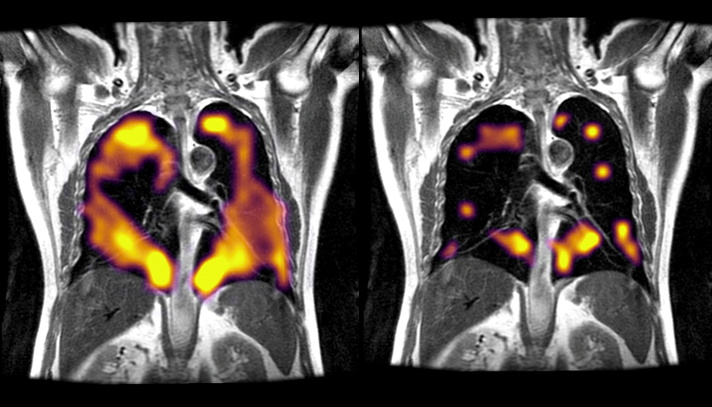Thousands of people suffering with long COVID will benefit from new research programmes backed by £19.6 million to help better understand the condition, improve diagnosis and find new treatments.

Among the 15 studies that will receive government funding through the National Institute for Health Research (NIHR) is the EXPLAIN study, supported by the NIHR Oxford Biomedical Research Centre (BRC), which will use hyperpolarised xenon MRI scans to look at ongoing lung damage in non-hospitalised COVID-19 patients.
EXPLAIN, which will receive £1.8 million, is a study run jointly with Sheffield University. It will seek to diagnose ongoing breathlessness in people with COVID-19 who were not admitted to hospital, using MRI scans to trace inhaled gas moving into and out of the lungs to assess their severity and whether they improve over time.
Its Chief Investigator, Professor Fergus Gleeson, who leads an Oxford BRC imaging sub-theme and is a Consultant Radiologist at Oxford University Hospitals NHS Foundation Trust, said:
“Following on from our earlier work using hyperpolarised xenon MRI in patients following hospitalisation with COVID-19 pneumonia, where we showed that their lungs may be damaged even when all other tests were normal, it is critical to determine how many patients with long COVID and breathlessness have damaged lungs, and if and how long it takes for their lungs to recover.

“Hyperpolarised xenon MRI is a safe scanning test that requires the patient to lie in the MRI scanner and breathe in one litre of the inert gas xenon that has been hyperpolarised so that we can see it using MRI. The scan takes a few minutes and does not require radiation exposure, so it may be repeated over time to see lung changes. Using this technique, we can see the xenon – which behaves in a very similar way to oxygen – move from the lungs into the blood stream. In this way, we can see if there has been damage to the airways in the lungs, or to the areas where oxygen crosses into the blood stream, which appears to be the area damaged by COVID-19.”
Participants will undergo a 15-minute scan using low levels of xenon gas, which will display lung function and – if abnormalities are found – comparisons of data across different groups of participants recruited from Oxford and Sheffield can help assess their severity and whether they improve over time.
Some EXPLAIN patients will also have a separate scan to see if heart damage can be identified. If the MRI scans separate patients with and without lung disease, further CT scans can be analysed, using artificial intelligence and blood samples to identify associated conditions and inform the development of treatments.
The latest research shows that although many people make a full recovery following COVID-19, a significant proportion of people continue to experience chronic symptoms for months. These ground-breaking studies aim to help those people affected return to their normal lives.
The projects will focus on:
- Better understanding the condition and identifying it
- Evaluating the effectiveness of different care services
- Better integrating specialist, hospital and community services for those suffering with long COVID
- Identifying effective treatments, such as drugs, rehabilitation and recovery to treat people suffering from chronic symptoms
- Improving home monitoring and self-management of symptoms, including looking at the impact of diet, and
- Identifying and understanding the effect of particular symptoms of long COVID, such as breathlessness, reduced ability to exercise and brain fog
Impact of vaccination
Another Oxford BRC project to get funding is a population-based cohort study using linked NHS data to determine the impact of COVID-19 vaccination on preventing long COVID. It is led by Professor Daniel Prieto-Alhambra, an epidemiologist at the Nuffield Department of Orthopaedics, Rheumatology and Musculoskeletal Sciences.
The study will look at whether a COVID vaccination can prevent long COVID by comparing the risk for long COVID in adults who have received a first dose of a COVID vaccines to unvaccinated adults. The study will also look at the different COVID vaccines and compare them to see how effective they are at preventing long COVID.
A member of the team, Dr Annika Jödicke, said: “Especially for healthy, young people with a low risk for severe COVID-19 disease, potential long COVID complications remain a major concern. We need to understand the impact vaccination has on preventing long COVID. This is an important aspect also to be considered in future risk-benefit evaluations for COVID vaccines.”
Her colleague, Dr Victoria Strauss, added: “While COVID vaccine can provide excellent protection against severe diseases, we do not know to what extent vaccine is effective against long COVID nor which vaccine brand provides better protection against long COVID. This new funded project can provide new evidence on these important gaps. We hope it would provide public more complete pictures on risks and benefit on COVID vaccine.”
“This new research is absolutely essential to improve diagnosis and treatments and will be life-changing for those who are battling long-term symptoms of the virus.It will build on our existing support with over 80 long COVID assessment services open across England as part of a £100 million expansion of care for those suffering from the condition and over £50 million invested in research to better understand the lasting effects of this condition.”
Health and Social Care Secretary, Sajid Javid, said: “Long COVID can have serious and debilitating long term effects for thousands of people across the UK, which can make daily life extremely challenging.
Professor Nick Lemoine, Chair of the NIHR’s long COVID funding committee and Medical Director of the NIHR Clinical Research Network (CRN), said: “This package of research will provide much needed hope to people with long-term health problems after COVID-19, accelerating development of new ways to diagnose and treat long COVID, as well as how to configure healthcare services to provide the absolute best care. Together with our earlier round of funding, NIHR has invested millions into research covering the full gamut of causes, mechanisms, diagnosis, treatment and rehabilitation of long COVID.”
The projects were funded following a UK-wide research call for ambitious and comprehensive research into understanding and addressing the longer term physical and mental health effects of COVID-19 in non-hospitalised people and will build on the existing research already commissioned to look at long COVID.
The selection process for this broad range of innovative studies into long COVID involved people with lived experience at every stage. Their input has been invaluable in shaping the outcome of this call and the research projects which will receive funding.
These new projects follow the four studies announced earlier this year, backed by £18.5 million, to help better understand the causes, symptoms and treatment of the condition.